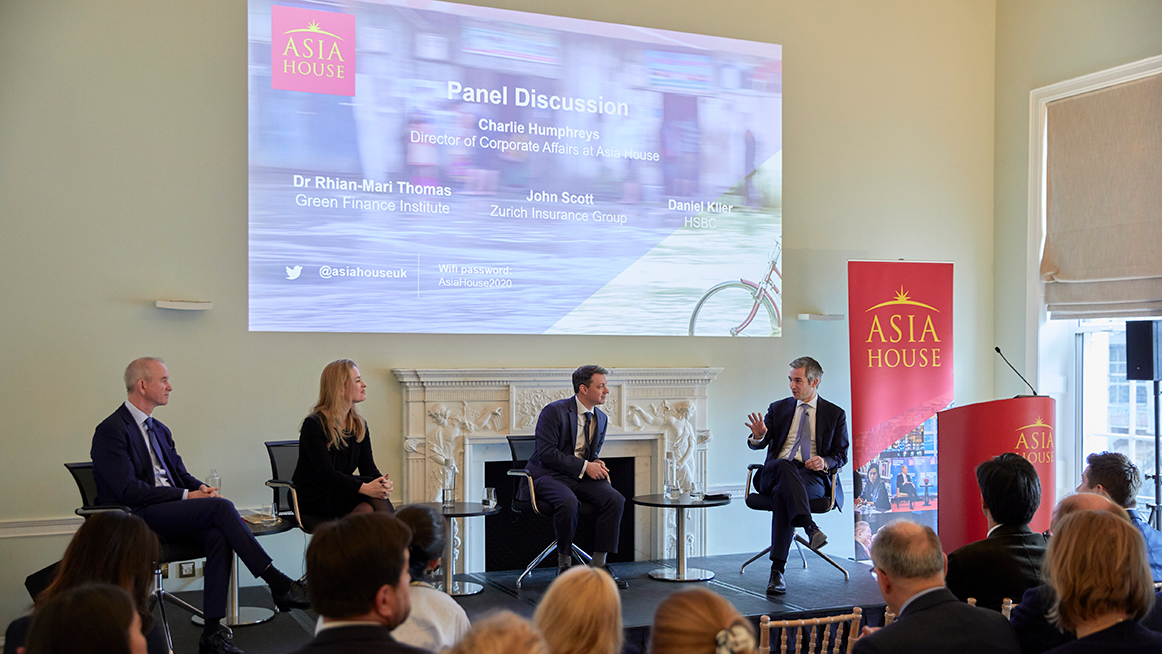Driving commercial and political engagement between Asia, the Middle East and Europe
Driving commercial and political engagement between Asia, the Middle East and Europe
Driving commercial and political engagement between Asia, the Middle East and Europe

The amount of private capital currently being leveraged to combat climate change “is wholly inadequate,” and global finance needs to do more to tackle the issue, an Asia House conference has heard.
Speaking at the Climate Change Risk and Response conference, held in partnership with McKinsey & Company, Dr Rhian-Mari Thomas OBE, Chief Executive of the Green Finance Institute, called for greater efforts to address the challenges of climate change.
“In the last couple of years, there’s been just over 560 billion dollars, on average, of private capital that has been put towards the climate emergency,” Thomas said. “It is wholly inadequate.”
However, while warning that climate change is the “largest single systemic risk to the financial services,” Thomas did identify a shift in the right direction through the “greening” of the sector, with better reporting and disclosures on the rise.
Thomas singled out the work of the Task Force on Climate related Financial Disclosures (TCFD) – a voluntary framework in which 1,000 companies worldwide are sharing information on how the climate impacts their businesses – for particular commendation.
TCFD is “doing a fantastic job at raising the global dialogue around disclosure,” she said.
Yet there is still room for improvement, according to Daniel Klier, Group Head of Strategy and Group Head of Sustainable Finance, HSBC.
While agreeing that disclosures have come a long way and the TCFD is a positive, consistency remains a challenge, he said, highlighting how two of the most comparable banks in the world, Citibank and HSBC, have entirely different TCFC disclosures and therefore cannot be compared to each other in terms of exposure to climate risks.
He also warned that only clearly-identifiable risks are currently being discussed. People are concerned about “flood risk in Florida” and “whether a new coal fire powerplant is still viable” in 50 years, but “we struggle to get to the next level” of risk, he said.
This next level should include making better arrangements for transition sectors, making sure that climate adaption is also happening outside of public markets, and fully integrating climate risk into the risk management frameworks of banks worldwide.
Although some significant steps were taken for the latter, we are still “quite far away from making this a system change that happens around the world,” Klier said.
Thomas argued that in order to achieve this system change, financial services will need to adopt “forward looking scenarios and stress tests,” rather than relying on “backward looking models and extrapolation.”
There are still many unanswered questions, however, when it comes to making these changes on a governmental and societal level, John Scott, Head of Sustainability Risk at Zurich Insurance Group, told the conference.
The Paris Agreement, he argued, has not been turned into “real policy,” and there is limited agreement on an effective carbon price and who will pay it, he said.
Additionally, there are questions about how we will handle the huge human impact, as consumer behaviour will have to change and individuals working in transition sectors, such as the coal industry, will be put out of work. New technologies will be needed to address climate change, he added.
“There’s a whole range of opportunities for investors, for governments to incentivise with policies and for technologists to create new technologies to decarbonise,” Scott said.
In response to a question on whether some of these issues could be solved naturally by the market, or whether it requires robust regulation, Thomas said, “I think the answer is, if we had all the time in the world, then absolutely yes. But we don’t.
“What we have is a case of market failure, where the risks and common externalities are not being accurately priced by the market,” she said, adding that regulators will need to step in, “given the urgency of the situation.”
Thomas also highlighted an important ruling made in regard to Heathrow’s third runway – “the first legal ruling in the world to demonstrate that the Paris agreement is legally binding,” she said.
The panel ended with some concluding remarks by McKinsey Global Institute Director and Senior Partner, Jonathan Woetzel, who gave a keynote address and presentation during the conference.
“The statements that we make today represent a transition from a status of not knowing the consequences to knowing the consequences,” he said.
“And with that comes the responsibility to act on them.”
